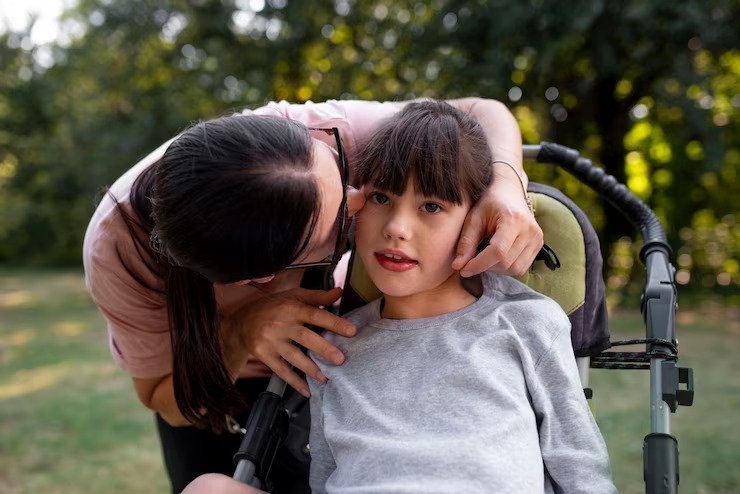Having children with special needs can be overwhelming, especially for first-time parents; it’s not easy teaching them things and helping them adapt to a world not designed for special kids. Recent studies by the CDC show that every sixth child in America has some developmental disability. Unfortunately, disabled children are often neglected by society.
They are seen as a burden to parents and caregivers, a perception that leads to discrimination against them. With that in mind, this article will help you learn a few ways to take care of your children and help them become successful members of society.
A diagnosis stating that your child has a developmental disability can be terrible news for anyone. This usually stems from depression, knowing there are limited ways of handling special children.
Effective parenting, in this case, means you should advocate for your child’s special needs, listen to what they need, and make your home more inclusive. Know that parenting differently-abled kids can be stress-free when equipped with the right knowledge.
1. Seek professional help
Remember that seeking professional help is essential for your kid’s well-being. You can find educational resources on the internet for dealing with issues like birth injuries. A typical example would be a child who has Cerebral Palsy. In this case, a cerebral palsy guide would be crucial to understand how it affects the child long-term and ways of holding the negligent party accountable.
These guides help you get the information and resources necessary to ensure the best life for your kid.
2. Be proud of your child
Many parents stay in denial about their children’s disabilities; this denial comes from the deep-rooted fear that this disability would prevent the kid from leading a happy life.
This isn’t true at all! With the right parenting strategies, you can support your child and teach them how to navigate the world independently.
Love your disabled children unconditionally, be proud of their success, and strive to make their surroundings as inclusive as possible.
3. Find local support groups
Know that you’re not alone, as many kids in the United States suffer from different disabilities. You should find support groups in your country or worldwide to find the necessary resources for your kid’s proper growth and development. For instance, you can search online for dedicated support groups for children with special needs.
By contacting these groups, you can share your experiences with other parents with disabled kids and benefit from their ideas.
4. Socialise with the kid
Kids with disabilities can struggle socially and may be uncomfortable dealing with people outside. However, parents should encourage their kids to socialize and go out with them to help them overcome shyness.
Remember that therapy and counseling shouldn’t be the only places your kid can socialize. Attend birthday parties and other events with your children and help them improve their social skills.
5. Research your kid’s disability
Learn as much as you can about your kid’s disability. That’s how you can prepare yourself to handle your child more effectively and make the house inclusive of their special needs.
This research isn’t limited to searching about the disability online but also involves speaking to certified professionals. Search for grants, provisions, and other financial resources for your kid. This research will help you plan the kid’s future properly.
6. Invest in Pets
Getting your child a pet can make the treatment more effective. “Animal therapy” has become popular today, as many parents bring home different types of animals for their kids for emotional comfort.
Getting them an animal to play with and cuddle with grows their social skills, brings stability, and makes them more peaceful.
Dogs and cats have helped many kids with ADHD and behavioral issues cope better with their disabilities. You can also get an aquarium, geckos, and guinea pigs for your kids to keep them engaged.
7. Don’t ignore what the doctor says
Don’t forget that your doctor knows better about disabilities better than you. So, don’t undermine the authority of the doctor. By cooperating with healthcare professionals, you can see quick progress in your child’s condition.
You must be attentive to their needs, patient with the medical staff, and make the house as inclusive as possible.
8. Don’t be rude or let anyone talk to them rudely
Remember that you shouldn’t be polite to your disabled kids out of sheer sympathy; be polite because they deserve to be treated like normal kids. Don’t be impatient with them because kids with special needs can’t help themselves.
Be an advocate for your child; don’t let the world make them feel unimportant. Protect them from discrimination, and ensure the same when your kid visits the doctor.
9. Be more than a caregiver
As a parent and primary caregiver, don’t let your parental status prevent you from acting like one, i.e., it’s your job to stop the kid from making wrong choices. Limit the child’s screen time, ask them to get enough sleep, get them to work out daily, and restrict how much junk food they can consume.
In short, don’t forget that you have parental duties as well. You must enforce healthy habits and make them take their meds.
10. Focus on yourself too
Don’t forget about your well-being, as statistics have shown that parents with disabled kids are more vulnerable to mental health issues. Surveys show that 37% of mothers of ASD-diagnosed children have mental health problems, e.g., stress and anxiety. So, sleep on time, exercise more often, and take breaks to regulate your conflicting emotions.
Conclusion
So, how can you be a better parent for kids with disabilities? In a nutshell, be proud of your kid and give unconditional love to them. Seek professional help so you may better understand their disability.
Socialise with the child and seek support groups for their well-being. Search about the kid’s condition and learn how to make the house more inclusive. Get a furry little animal friend to play with your kid.
Know that you are more than the child’s caregiver; be the parent the kid needs right now. Try not to be rude if the child does or says something unpleasant. In the end, search for disability guides online to know what financial resources you can get to treat your child with special needs.
Read Also:

















